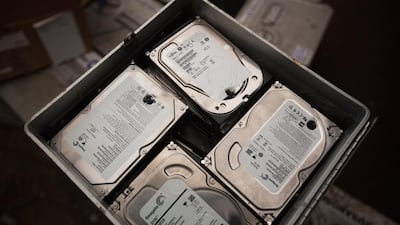Switzerland has opened a probe after reports that US and German intelligence services reportedly spent decades plundering the top-secret communications of governments around the world.
The CIA and German intelligence agency BND secretly ran a Swiss encryption company, Crypto AG, that sold devices to more than 100 governments around the world.
The Swiss company made and sold code-making equipment to Iran, India, Pakistan, Latin American nations and dozens of other countries. It was a top supplier of devices for encrypting communications from after the Second World War until the beginning of this century.
Unknown to all the governments using Crypto to encrypt their internal communications, the company was secretly owned by the CIA and BND.
Together, the US and Germany rigged the equipment so they could easily crack the encryption codes and read other governments' messages, according to reports by the Washington Post and German and Swiss television.
Citing a classified internal CIA history of what was originally called operation “Thesaurus” and later “Rubicon”, the reports said that in the 1980s, the harvest from the Crypto machines supplied roughly 40 per cent of all the foreign communications US code breakers processed for intelligence.
Meanwhile, the company took in millions of dollars in profits that went to the CIA and BND.
"It was the intelligence coup of the century," the CIA history file says, reported the Washington Post.
“Foreign governments were paying good money to the US and West Germany for the privilege of having their most secret communications read by at least two [and possibly as many as five or six] foreign countries.”
The BND had no immediate reaction to the story. CIA spokesman Timothy Barrett declined to comment on the reports.
Crypto was founded by Russian-born entrepreneur Boris Hagelin, who fled Scandinavia to the United States in 1940 when the Nazis occupied Norway.
He had created a rudimentary portable encryption machine that could be used in the field. About 140,000 were produced for US troops during the Second World War by the Smith Corona typewriter company in New York.
After the war, Hagelin moved to Switzerland and began producing more advanced encryption machines, raising concern among American spies who worried it would allow governments everywhere to shield their communications.
But the premier US cryptologist, the National Security Agency’s William Friedman, persuaded Hagelin to restrict sales of his most advanced machines to countries approved by Washington, while older machines – with penetrable encryption – were sold to those not on the list.
When integrated circuits replaced mechanical encryption in the 1960s, the NSA helped Hagelin design new machines that included coding US cryptologists knew how to crack.
When Hagelin sought to retire, the United States headed off a French government effort to buy his company and arranged its own takeover.
In 1970, the US and Germany reached a deal to take it over for $5.75 million (Dh21m) – with the stipulation that the French be excluded.
This sale gave the US and Germany control over almost all of Crypto AG’s operation, hiring the staff, designing the technology and directing sales.
The intelligence operation underlying Zug-based Crypto had long been suspected and alluded to, but never proven. The company’s true ownership was masked by front companies in Liechtenstein registries.
While scores of countries bought Crypto’s coding machines, the West’s top adversaries, Russia and China, never trusted them.
Apparently nervous about being exposed, and uncomfortable with the CIA’s aggressive targeting of both friends and rivals with Crypto machine sales, BND pulled out of the relationship and the CIA bought its shares in the 1990s.
Bernd Schmidbauer, former secret service coordinator for the German government, confirmed the story to ZTE.
“The Rubicon operation clearly contributed to making the world a little safer,” he said.
With the advent of online technology, including advanced encryption apps that are now more powerful than the type of encryption machines Crypto AG made, the CIA sold the company in 2018, the Washington Post reported.
It was broken into two parts. Its Swiss-client business remained in Zug under the new name CyOne, and the international business and company name were taken over by Swedish investor Andreas Linde.
The Swedish company, Crypto International, called the news reports “very distressing”.
“We have no connections to the CIA or the BND and we never had,” the company said in a statement on its website.
“We are currently assessing the situation and will be commenting once we have a full picture.”
Carolina Bohren, a Swiss Defence Ministry spokeswoman, said the government was informed of the Crypto AG case last November and has named a retired federal judge to investigate. Meanwhile, the country has suspended export licences for Crypto’s successor companies.
“The events in question began in 1945 and are difficult to reconstruct and interpret today,” Ms Bohren said.

